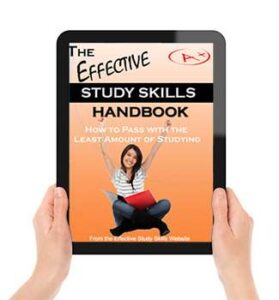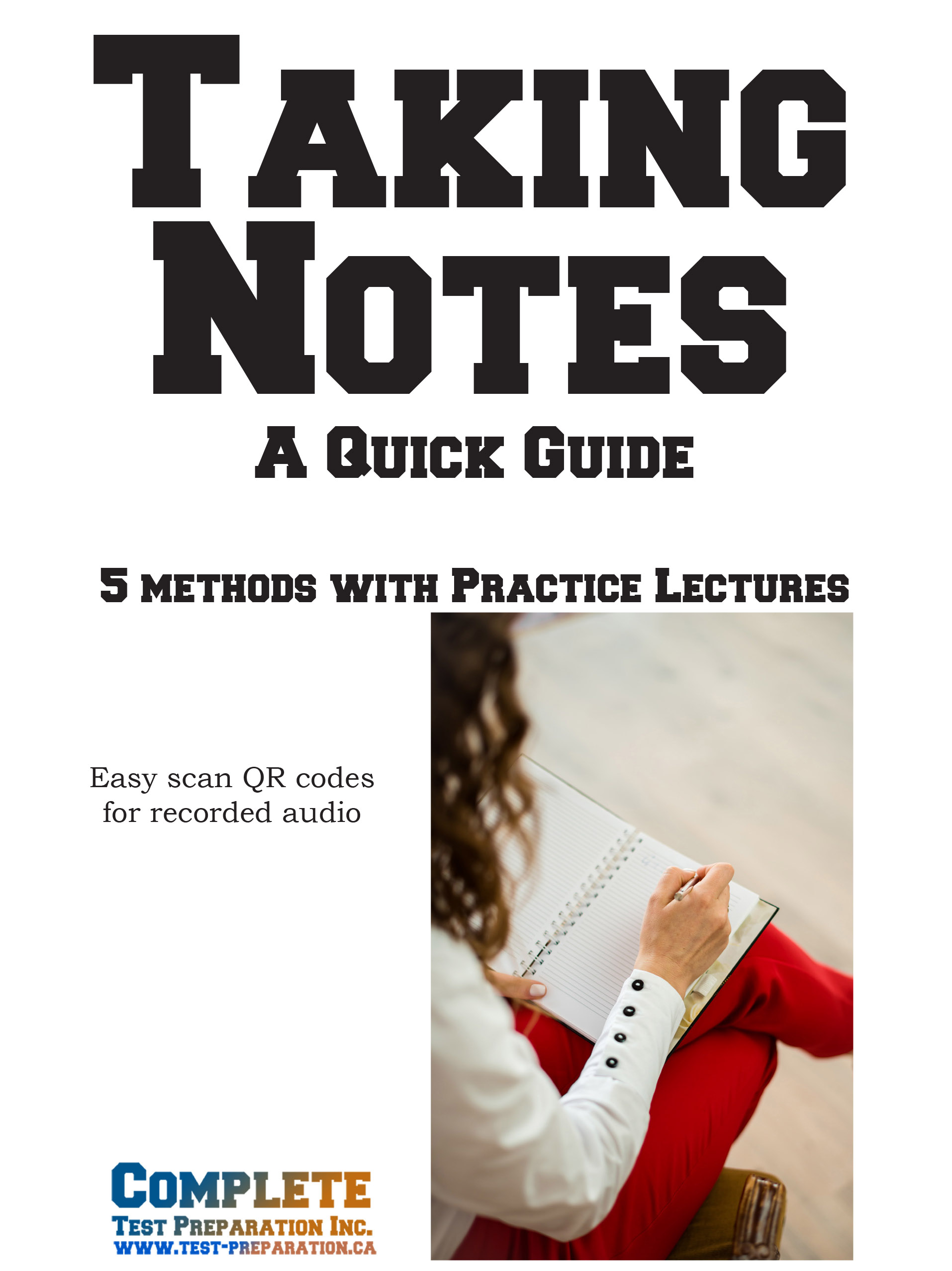In the Test Room – The Complete Guide
- Posted by Brian Stocker MA
- Date October 2, 2007
- Comments 2 comments
Get In The Mood
Keep a check on your emotional status. If your emotions are shaky before a test it will effect your preparation. A shaky emotional state can determine how well you do on the test. Use these six ways to give yourself a boost into a good mood for taking a test.
Audio Version of this Post
Starting The Exam
- Makes sure you are in the right exam. Very important! There may be other testing session for the same class and classes with similar names. Look for others from your section and double check the section number.
- Remember that every instructor has different requirements and will expect different things. Read instructions for each exam so that you are sure to provide accurate answers.
Get the Complete Guide to Studying
Get Organized and Get better MarksGet the Complete Guide to Taking Notes
Learn 5 note taking stylesTaking a Test? Complete Guide to Multiple Choice
Increase your Score on any Test!Go with the flow – Don’t Fight It
There are lots of reasons to dread tests. Tests classify students and create categories of people. Tests can be unfair by rating students higher that can memorize and rating students that analyze lower. Conformity is an asset on tests, but creativity is often a liability.
Everyone knows this and it probably isn’t fair but that’s the way it is, so the first step is to accept it and get used to it.
You will get higher marks when you realize tests count and give them your best effort. Get into showing off your intelligence. If you can’t get into showing off, think about your future and the career that comes from straight A’s. Avoid the negatives and focus on anything that lift your enthusiasm and increase your motivation.
Keep Breathing
For most people, when we are anxious, tense, or scared, we either stop breathing or breathe very shallow. Focus on your breathing – breathe deeply and regularly. When you continue to breathe deeply you will notice you exhale all the tension. More on Handling Test Anxiety.
With continued practice of the relaxation technique, you will immediately start to know the muscles that tense up under pressure. Call these your “signal muscles.” These are the ones that will yell at you saying “hey lighten up you’re getting tense.” Take the time to relax. Breathing Exercises to Reduce Anxiety.
After practicing a few times, you will get into the habit of checking yourself regularly and when you find you are tense, relax.
Get there early enough to relax
If your are wound up, tense, scared, anxious, or feeling rushed, it will cost you. Get to the exam room early and relax before you go in. This way, when the exam starts, you are comfortable and relaxed. Just make sure you don’t get to the exam room too early that will just give you too much time to sit there and get wound up all over again.
Start with practicing in your room, then practice in the library, and last in the exam room. If you can, go to the exam room a few days ahead of time. When you are used to the technique, use it any time you feel tense during the exam.
Get comfortable in your chair
Make every muscle in your body tense and keep it that way. Start with your head then work down your body. Notice the feel of every muscle as you go down your body. Scowl to tense your forehead, pull in your chin to tense your neck. Squeeze your shoulders down to tense your back. Pull in your stomach to your ribs, make your lower back tight then stretch your fingers. Make your leg muscles and calves knot then stretch your feet and your toes. You should be as stiff as a board throughout your entire body.
Now relax your muscles in reverse starting with your toes. Notice how all the muscles feel as you relax them. Make sure to keep all the muscles relaxed as proceed up your body. Focus on how you are feeling as all the tension leaves. Start breathing deeply when you get to your chest muscles.
- Don’t sit near any windows so what goes on outside doesn’t distract you.
- Sit away from the aisle so you aren’t distracted by people that leave early. People that leave the exam room early are usually the ones who fail. Don’t compare your time to theirs.
- Don’t sit near any attractive friends or classmates. This will be a distraction – you can chat with them all you like after the exam.
- Sit in a well lit area of the room.
- Ask the instructor to close the door if there is a lot of noise outside. After all, it’s the instructor’s job to create the perfect test conditions. If the instructor does not want to close the door, block out the noise as best you can. Don’t let anything disturb you.
- Make you have enough pencils, pens and whatever else you will need. Bring candy bars also in case you get hungry. It can be a big distraction if you are hungry.
- Make sure you’re warm by bringing a jacket or sweater. Don’t get distracted by being cold. Dress in layers so that you are prepared for a range of temperature.
- Have a watch to bring with you so you always know what time it is. Don’t look up at the clock as something may distract you. If you don’t own a watch, buy one or borrow one. You don’t want students with watches having the advantage over you by knowing what time it is.
You may feel as though you need to take pep pills or tranquilizers. That may be fine, however realize there are pros and cons. Some students need help from pills, however it is unlikely they won’t help you pass an exam.
If you didn’t get enough sleep, pep pills will work to keep you awake but they will not help you to focus and concentrate. What pep pills will do is make it harder for you to think straight when solving complicated problems on the exam.
If you are the type that gets extremely anxious, tranquilizers can help you relax. They have not proven effective with young students. On the down side, tranquilizers not only make you less alert, they can also decrease your motivation. Being motivated is what you need to get you through an exam.
If you have never taken pep pills or tranquilizers, right before an exam is not the time to start. You need to know how they will effect you before you use them during an exam. Think about it first and weight the pros and cons.
Ending
Always leave time at the end of the exam to check your answers. You may find you have made mistakes or left out information. By correcting this you will earn more points. Continue this process until you have used all available time. Do not leave early, once you have left the exam you will not be able to correct any of your mistakes. Use your time well and you will be faced with less regrets after the test.
See Also – The Ultimate Guide to Test Preparation and Mental Preparation for a Test
How to Study

… without endless hours of cramming
… without the need for tutoring
… and without sacrificing the things that matter to you!
Multiple Choice Secrets!

How to Take Notes
Learn 5 Note Taking Methods – With Full Explanation and Examples!
Taking notes is an essential academic skill and you will be doing a LOT!
Learn More and Start Practicing
Date Published: Tuesday, October 2nd, 2007
Date Modified: Wednesday, July 17th, 2024
You may also like
Five-Day study plan – Ready for Blast Off Day!
Going into my senior year, one could assume that I am well experienced in the subject of test-taking, yet if anything, life has taught me that one can always learn more. My recent conversation with a friend helped me to …
How to Take a Test — the Basics How to Take a Test – 2 Common Mistakes on a Test – and how to avoid them! Written by, Brian Stocker MA., Complete Test Preparation Inc. Date Published: Monday, March 4th, …



2 Comments
I’m impressed! Cool post!
Thanks for sharing this